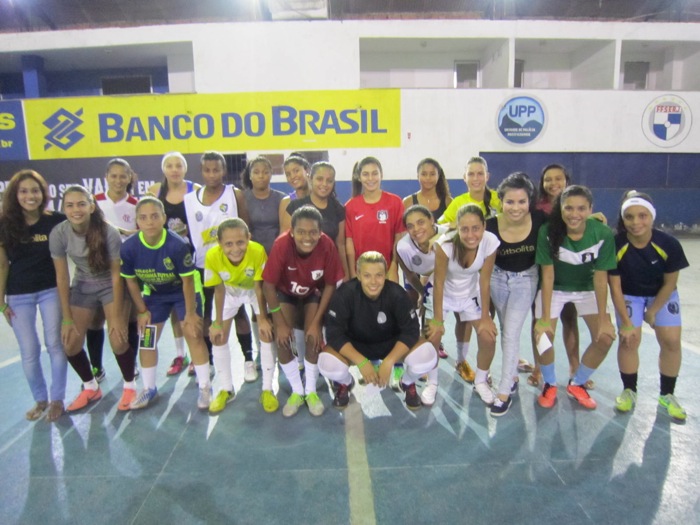We were thrilled to meet the female futbolitas from Brazil’s biggest ‘favela’ (or slum), Rocinha, during our first week in Rio de Janeiro. Although Brazil’s favelas have a reputation for being dangerous and full of crime, our favela guide (a native himself), Zezinho, was adamant on dispelling this notion.
After a 30-minute journey uphill by bus, we arrived in Rocinha, where we found a peace-loving community that thrived on looking out for one another and supporting social projects. The favela is South America’s biggest, with a population of more than 250,000.
Rocinha’s female football team plays in a weekly league that is contested between favelas of different districts within the country. The girls – who are between the ages of 15 and 27 – meet for training three times a week in a hall next to the police quarters, which they share with the boys team.
One of the key issues the the coach of the Rocinha women’s team hopes to solve is that of social problems that are prevalent within the community. For example, girls who do not attend school may find themselves pregnant at a young age, which Zezinho adds is a “big problem” within the favela community.
Other extreme situations include crime, or joining a gang to make up for the lack of family support from their respective homes.
“We need to let girls know that there is more to life than getting pregnant, sitting around or getting a boyfriend at 14. There are avenues for them, and football is one of the best ways. They develop the mentality and toughness from the favela and it shows in the sport,” he said.
Vitor Alexandre, the coach of Rocinha women’s team, echoed Zezinho’s sentiments.
“It is easy to get distracted here, especially for girls, but my goal is to show them a new way through football, to motivate them, and to give them hope,” he said.
“Many of the girls here are really good and they just need a little bit of belief.”
Alexandre added that while drug problems were a common issue within the favela, none of the girls he trained with were involved in it.
“The girls here are disciplined, and committed to football, and many of them see it as their way out. So we really want them to come here every week with the belief they can change their future,” he said.
Indeed, when asked around, many of the girls were passionate supporters of local clubs Flamengo and Vasco de Gama, and when asked who they looked up to, five-time FIFA Women’s World Player of the Year Marta was a common denominator.
“When you live in a favela, you have nothing to hide. People may look down on us, but we have a lot to be proud of with a great community of people here, and we all look out for each other,” said Zezinho.
Rocinha in itself is a self-sufficient community on its own and is dubbed a “city within a city” with ATM machines, Banks, 24 hour Pharmacies, Clinics, Supermarkets.
Despite the poverty faced on a daily basis, the residents were quick to greet us and share their stories, with a smile on their faces. Brazil’s happiest slum? Probably.
FUTBOLITA REFLECTIONS






